The Road Not Taken Questions and Answers
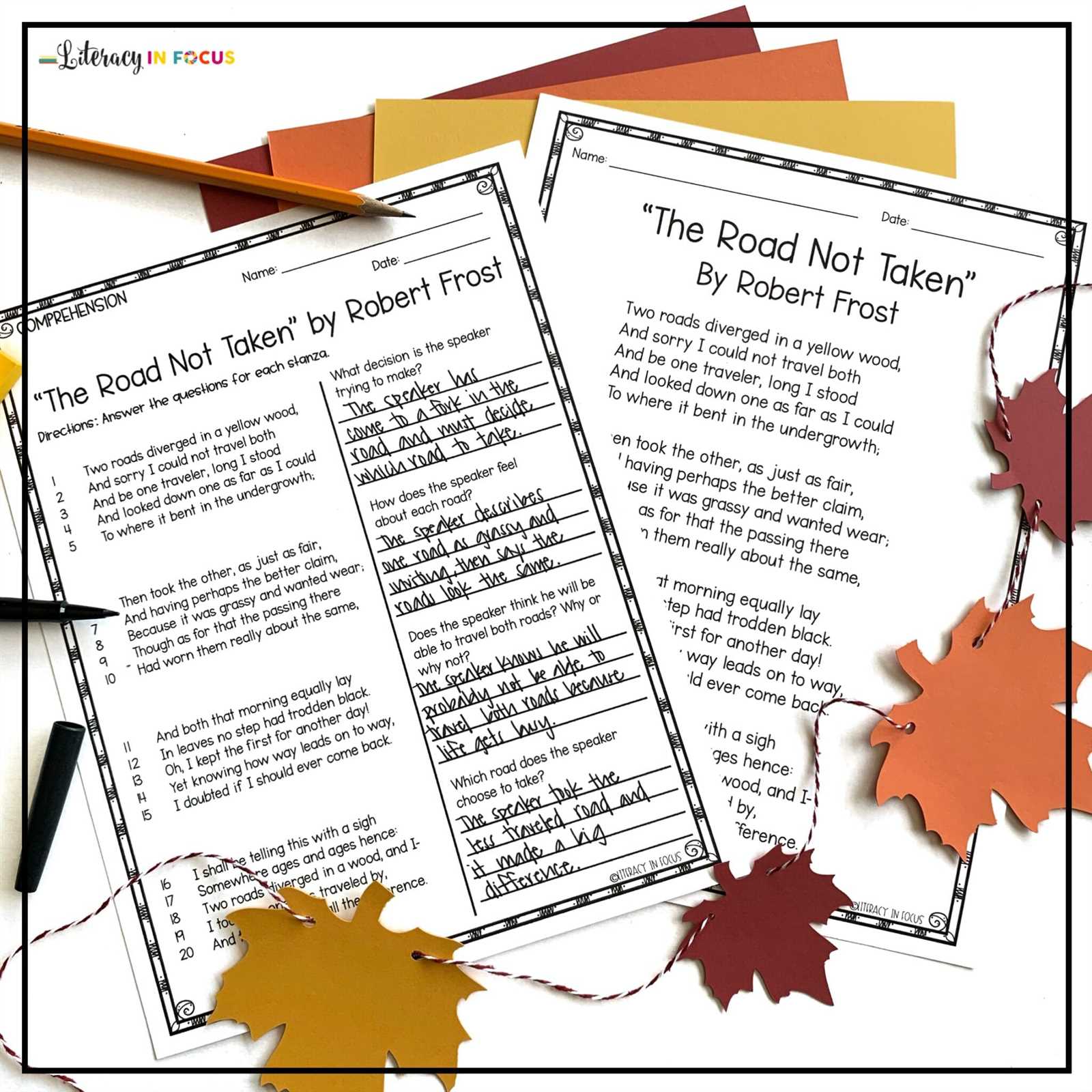
In literature, choices often symbolize life’s pivotal moments. Frost’s famous work reflects the deep emotional impact these decisions can have, questioning paths, regrets, and self-reflection. The speaker stands at a crucial point, pondering which direction to take, unsure of the future yet burdened by the weight of his choice.
Frost creates a vivid image of a moment that resonates with readers, emphasizing the uncertainty that accompanies every decision. Through metaphor and symbolism, this piece examines how each choice can shape one’s journey and influence later reflections.
Throughout the work, readers are invited to consider not just the immediate decision but the far-reaching consequences of their actions. The poem’s message explores the idea that the paths we choose are never as clear as they may seem, often carrying deeper significance in hindsight.
Understanding the Meaning of the Poem
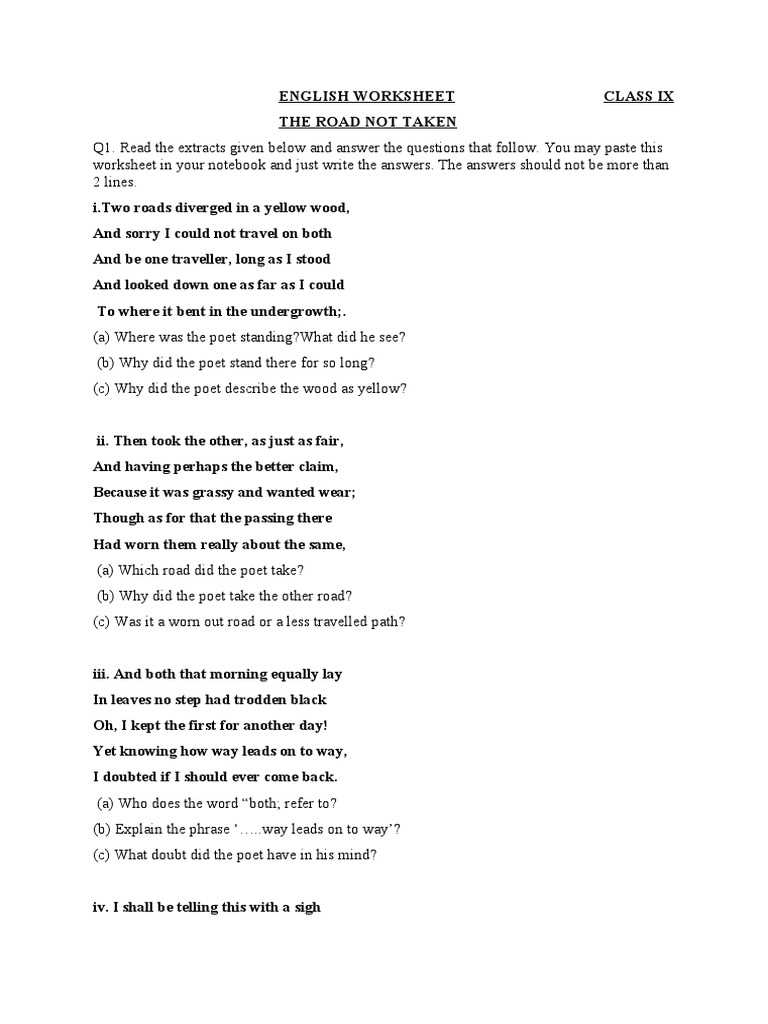
This piece delves into the concept of decision-making and its long-term effects. The narrator reflects on a moment of choice, illustrating how paths lead to different outcomes. This reflection goes beyond a mere crossroads, exploring themes of regret, uncertainty, and the passage of time.
Through simple yet powerful imagery, the poem portrays how choices, even those that seem insignificant at the time, can come to define one’s life. Frost captures the essence of human contemplation–looking back with questions about what could have been, yet knowing that every decision shapes one’s journey.
At its core, the poem reveals that no choice is without consequence, and each direction we choose builds upon the past. The speaker’s final sentiment reflects both acceptance and a sense of mystery about what might have occurred had another path been chosen.
Key Themes in The Road Not Taken
In this timeless poem, several profound ideas emerge, each intertwined with the concept of choice. Frost captures the complexity of decision-making, revealing how one moment can influence an entire lifetime. The following themes are essential to understanding the deeper layers of the work:
Choice and Consequence
The central theme revolves around the impact of choices on one’s path. Every decision, big or small, creates a ripple effect that shapes the future.
- Decisions reflect personal values and desires.
- Every choice carries weight, even when uncertain.
- Regret may arise from wondering what could have been.
Reflection and Regret
As the speaker looks back, there is a sense of questioning whether the right decision was made. This theme touches on the universal experience of wondering about alternate possibilities.
- Looking back evokes feelings of doubt about past decisions.
- Regret often emerges from imagined outcomes of different choices.
- Acceptance comes with the realization that every choice defines a unique journey.
Through these key themes, Frost explores how decisions shape our personal narratives, emphasizing the inevitability of making choices and the lasting effect they leave on our lives.
Exploring Robert Frost’s Style
Robert Frost’s writing is renowned for its simplicity, yet beneath the surface lies a wealth of complexity. His style combines clear, accessible language with deep philosophical insights, inviting readers to explore universal themes. Through vivid imagery and rhythmic patterns, Frost captures the nuances of life’s decisions, often weaving in natural landscapes as metaphors for personal growth and reflection.
Use of Nature as Metaphor
Frost’s mastery lies in his ability to transform ordinary scenes into profound reflections on life. Nature often serves as a mirror for human experiences, with elements such as forests, paths, or seasons symbolizing broader emotional and existential questions.
- Nature as a mirror: Elements like trees and paths often reflect internal struggles.
- Landscapes as symbols: Natural settings represent choices, conflicts, or journeys.
- Grounded imagery: Simple details, such as frost on leaves, evoke complex emotions.
Rhythm and Structure
Frost’s use of meter is deliberate yet unforced, creating a conversational tone that feels natural. While adhering to traditional forms like the blank verse, he often bends the rules, making his works feel both formal and spontaneous.
- Subtle rhythm: Frost uses meter to enhance the flow of thought and emotion.
- Conversational tone: His use of simple language makes complex ideas feel accessible.
- Innovative structure: The balance between structure and freedom reflects the themes of choice and uncertainty.
Through his unique blend of natural imagery, rhythmic patterns, and thematic exploration, Frost’s style continues to resonate, inviting readers to engage deeply with his work on both intellectual and emotional levels.
Symbolism of the Two Roads
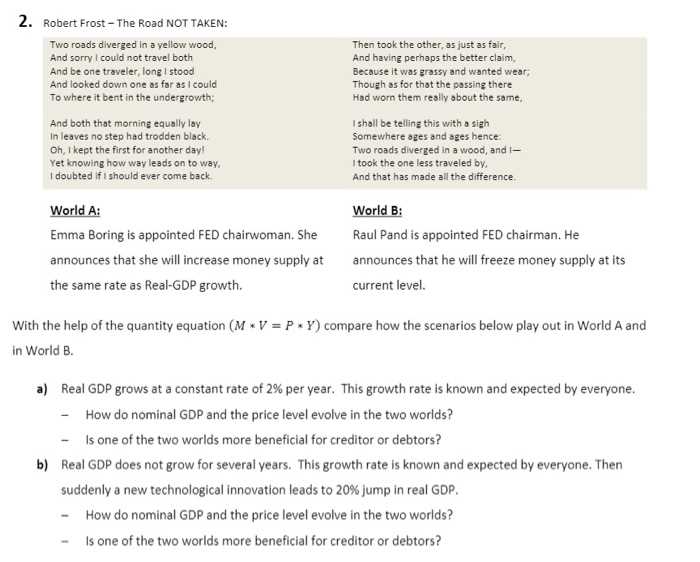
In Frost’s poem, the two paths serve as powerful symbols of choice, direction, and possibility. They represent distinct alternatives that one encounters throughout life, each with its own set of outcomes. The decision to take one path over the other mirrors the complexity of human existence, where every choice creates a ripple effect that can shape future experiences.
The paths in the poem are not simply physical objects; they are metaphors for the decisions we make, symbolizing the diverging courses our lives can take. One path is described as “really about the same,” indicating that choices are often more similar than they appear, despite the weight placed on them.
| Path | Symbolism |
|---|---|
| First Path | Represents the conventional or expected choice in life, often influenced by societal norms or traditions. |
| Second Path | Represents the more unconventional or less traveled option, often associated with personal desire, risk, or change. |
By using the imagery of two paths, Frost illustrates the tension between conformity and individuality, forcing readers to confront their own choices and the paths they have followed. The ambiguity surrounding which path is better highlights the theme that there is no perfect decision, only different experiences shaped by the choices made.
The Poem’s Reflection on Choices
Frost’s work provides a deep exploration of how decisions shape the course of our lives. Through vivid imagery and introspective narrative, the poem captures a moment of contemplation where every option seems to carry the weight of the future. The speaker grapples with the significance of a single choice and its lasting impact, inviting readers to reflect on their own life decisions.
Emotional Impact of Decision-Making
Each choice in life is accompanied by an emotional response, whether it’s doubt, hope, or regret. The speaker’s internal conflict reveals how even the smallest decisions can provoke deep emotional reactions.
- Uncertainty about the future is a natural part of decision-making.
- Choices are often accompanied by the fear of making the wrong one.
- Reflection on decisions later in life may lead to feelings of regret or satisfaction.
Consequences of Every Path
Each choice carries its own consequences, which are not always apparent at the moment of decision. The poem reflects on how actions taken in the past often shape the direction of one’s future in ways that are difficult to predict.
- Every decision, big or small, leaves a mark on one’s life.
- Choices are interwoven with unexpected outcomes that can lead to unforeseen changes.
- Looking back, decisions may seem more meaningful than they initially appeared.
Through its reflection on choices, Frost’s work encourages readers to consider how their own paths have shaped their experiences, emphasizing the inevitable impact of every decision we make, whether we fully understand it or not.
Why the Road Not Taken Matters
In this poem, the significance of unchosen paths is explored in depth. While one may feel compelled to focus on the decisions made, the ones left behind often hold equal weight. These missed opportunities shape one’s perspective, creating a sense of wonder about how different choices could have altered the course of life.
The Impact of Unmade Decisions
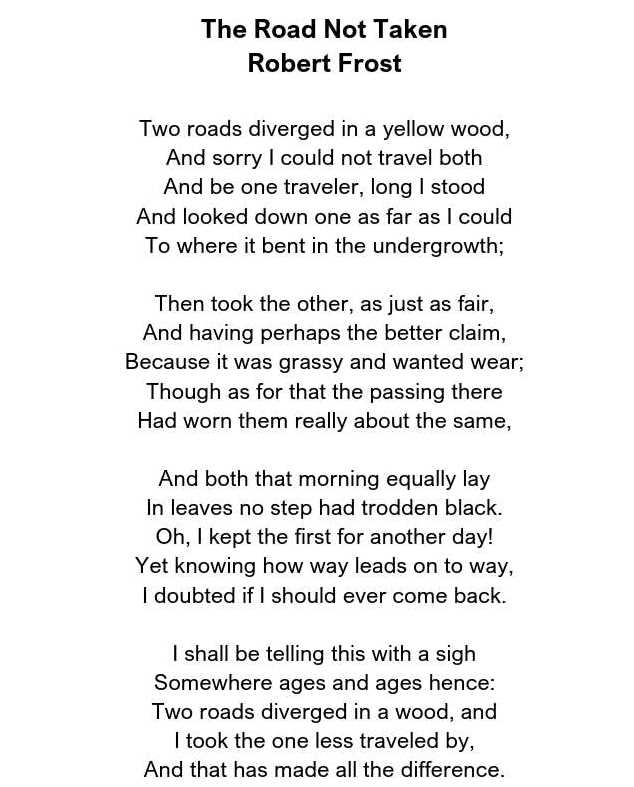
Often, what we don’t choose is just as important as what we do. The act of deciding, even when it appears inconsequential, sets a trajectory that influences our future in ways that become clearer only with time.
- Unchosen options can lead to new insights about one’s desires and values.
- Regret over missed choices can bring both clarity and a deeper understanding of self.
- What we leave behind can define who we become in the future.
Contemplation and Reflection
Reflecting on paths that were never walked can lead to a mixture of curiosity, doubt, or peace. These reflections often surface later in life, offering a chance to understand the broader scope of one’s decisions.
- Looking back, some choices seem inevitable, while others may appear as missed chances.
- Our decisions, though final in their moment, often prompt us to wonder about alternate outcomes.
- Understanding the significance of what was left behind can bring acceptance or insight.
By contemplating why certain paths are left unexplored, the poem emphasizes that what we do or don’t do plays a crucial role in shaping our personal narratives. The choices we make, as well as the ones we choose to leave behind, matter in ways that often become more evident as we reflect over time.
Analyzing the Speaker’s Perspective
The speaker in Frost’s poem presents a deeply personal view of life’s choices, revealing an internal conflict about the paths they have walked and those they left behind. Through this perspective, the narrator reflects on the complexity of decision-making and the emotions tied to these moments. Their tone shifts between curiosity, doubt, and contemplation, capturing a universal experience of grappling with the unknown consequences of past actions.
Conflict Between Certainty and Doubt
The speaker’s perspective is filled with uncertainty, despite appearing resolute in their choice. This tension highlights the difficulty in fully understanding the impact of decisions at the moment they are made.
- Confusion: Despite appearing certain at the time, the speaker wonders about the alternate outcome.
- Regret: There is a lingering feeling of wishing to understand what could have been.
- Acceptance: Ultimately, the speaker accepts the path they have taken, despite their lingering doubts.
Time’s Role in Shaping Perspective
As time passes, the speaker’s viewpoint shifts, suggesting that the weight of decisions grows over the years. What may have seemed insignificant in the moment later becomes central to their life story.
- Retrospection: Looking back, choices take on new meaning and significance.
- Perspective change: The passage of time allows for deeper understanding and clarity.
- Personal growth: As the speaker matures, their understanding of past choices evolves.
By analyzing the speaker’s perspective, we gain insight into the emotional complexity of decision-making and how time influences our understanding of past events. The poem illustrates that while choices may feel final, the passage of time allows for ongoing reflection and re-evaluation.
Impact of the Poem’s Structure
The organization of Frost’s work plays a significant role in conveying its central themes. Through careful arrangement, the poem creates a rhythm that mirrors the process of decision-making itself. Each stanza is structured to evoke a sense of progression, guiding the reader through the reflective nature of the speaker’s thought process. This arrangement not only enhances the emotional weight of the choices described but also underscores the tension between certainty and doubt that accompanies such decisions.
How Structure Mirrors Thought Process
The progression of stanzas is designed to reflect the speaker’s internal journey, as they contemplate different options and their eventual consequences. The form emphasizes the back-and-forth nature of decision-making, with some verses presenting moments of indecision and others depicting eventual resolution.
| Stanza | Focus | Effect |
|---|---|---|
| First Stanza | Initial choice between two options | Sets up the dilemma, creating tension and anticipation. |
| Middle Stanzas | Contemplation of the unchosen path | Highlights indecision, inviting readers into the speaker’s internal conflict. |
| Final Stanza | Resolution and reflection on impact | Brings closure to the emotional journey, emphasizing the significance of choices made. |
Impact of Rhyme Scheme and Rhythm
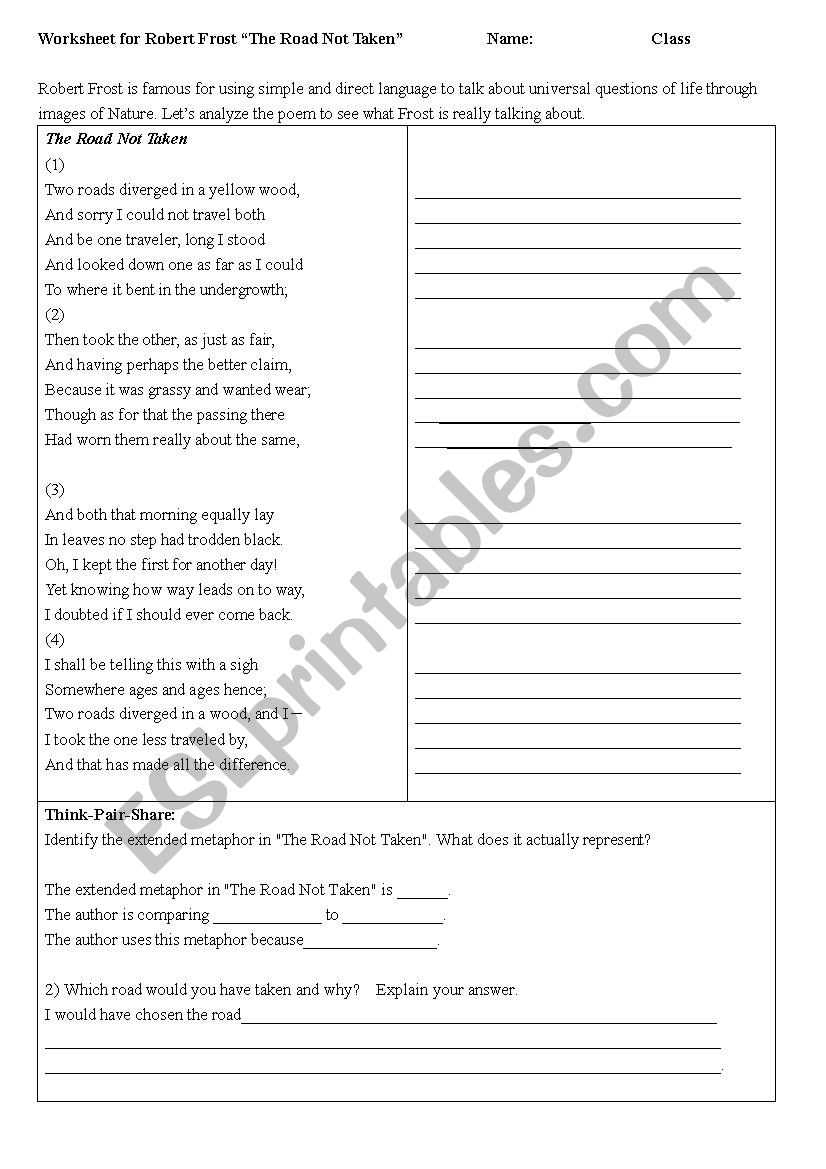
The consistent rhyme scheme and meter contribute to a sense of flow, guiding the reader’s experience of the poem. While the structure itself is formal, the subject matter invites a deeper reflection on the emotional complexity of life’s decisions. This balance between formality and introspection mirrors the way people grapple with choices in reality.
By using structure as a tool, Frost not only enhances the poem’s emotional depth but also underscores the complexity of decision-making itself. The form complements the themes of choice and reflection, offering a powerful means of engaging with the speaker’s experience.
Frost’s Use of Nature in Poetry

Nature serves as both a backdrop and a metaphor in Robert Frost’s works. Through vivid descriptions of landscapes and natural elements, he invites readers to explore deeper philosophical questions about life, choice, and human experience. Frost often uses the natural world as a mirror for emotional states and life’s challenges, drawing parallels between the external environment and internal reflections. By grounding his themes in nature, he makes abstract ideas more tangible, connecting personal struggles with the broader world around us.
Nature as a Symbolic Element
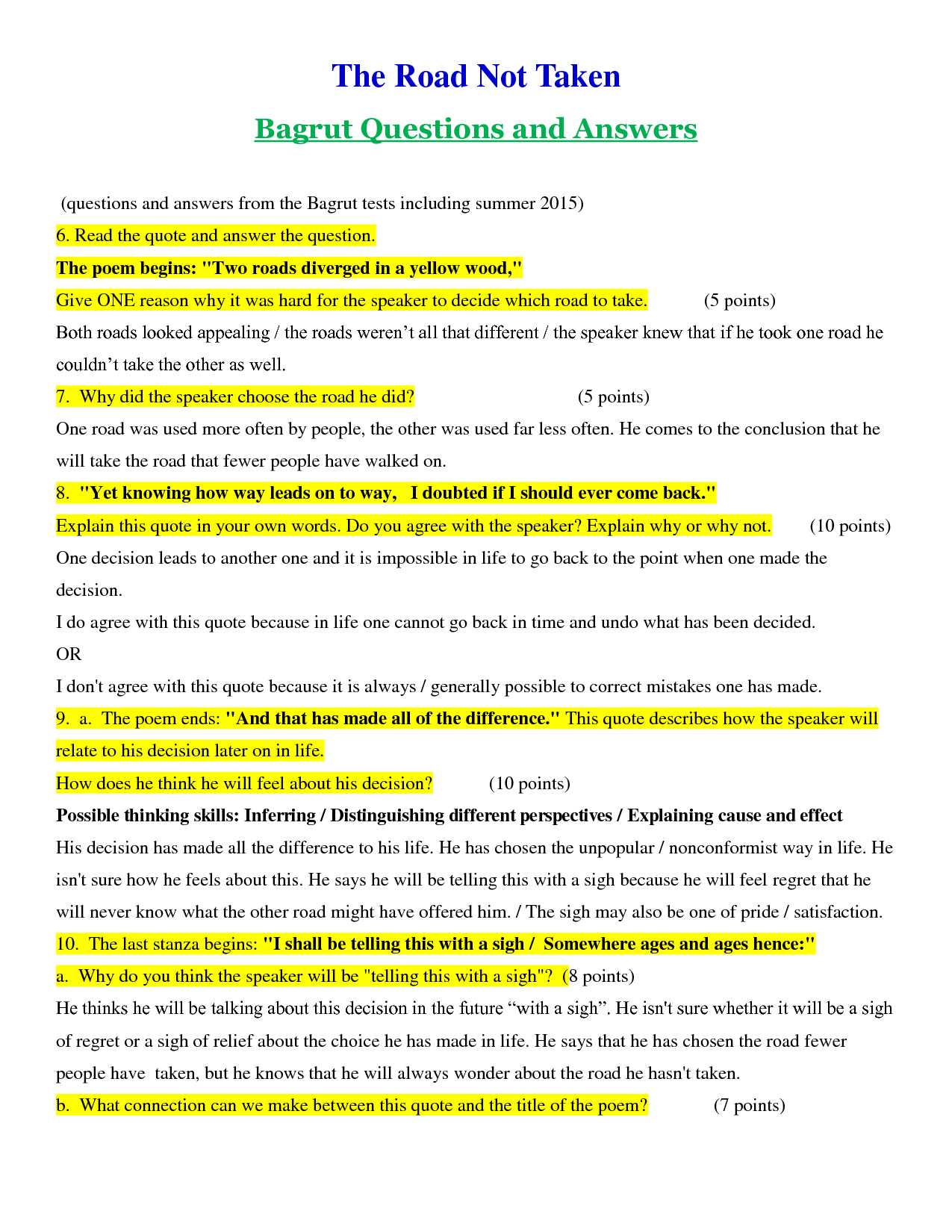
Frost masterfully integrates natural imagery to symbolize human emotions and life events. In his poetry, elements of nature such as trees, fields, and paths are more than just physical features–they reflect the complex inner landscapes of the human soul.
| Natural Element | Symbolism | Emotional Impact |
|---|---|---|
| Trees | Growth, change, and the passage of time | Represents life’s cyclical nature, evoking both hope and loss. |
| Paths | Choices, decisions, and opportunities | Highlights life’s dilemmas, fostering a sense of contemplation and uncertainty. |
| Snow | Purity, stillness, and isolation | Creates a serene but melancholic atmosphere, reflecting inner solitude or peace. |
Emotional Resonance Through Landscape
Frost’s use of nature creates an emotional resonance that allows readers to connect with his themes on a personal level. Whether it’s the quiet of a winter evening or the decision at a crossroads, nature evokes a sense of both the vastness of the world and the intimacy of individual choices. This interplay between the external world and internal experience helps make his poetry relatable and enduring.
Through his portrayal of nature, Frost not only paints vivid pictures of rural life but also uses it to delve into more universal human experiences. By blending the natural world with emotional depth, he crafts poems that resonate across generations, making nature an essential element in his exploration of life’s complexities.
The Concept of Regret in the Poem
In Frost’s poem, the theme of regret is central to the speaker’s experience, as they reflect on choices made in life. The emotional weight of wondering what might have been lingers throughout the poem, shaping the speaker’s view of their past decisions. This sense of regret is not merely about missed opportunities but also about the uncertainty that comes with every choice. The speaker’s internal struggle reveals how human nature grapples with the consequences of actions and the lingering doubt of unchosen possibilities.
Regret in this poem is not a simple feeling of sorrow; it encompasses a deeper reflection on how decisions are irreversible, yet continue to influence one’s life. The speaker’s acknowledgment that they will “sigh” in the future suggests that even after much time has passed, the weight of their decisions will remain with them, shaping their understanding of the past. This complex emotion is intricately woven into the fabric of the poem, allowing readers to connect with the universal experience of regret.
Through the speaker’s reflection, Frost highlights how regret is not just about missed chances but also about the desire for certainty in an uncertain world. The inability to predict how life might have unfolded if different choices had been made emphasizes the unsettling nature of regret and its lasting effect on the individual.
How ‘The Road Not Taken’ Relates to Life
Frost’s poem offers a poignant reflection on the choices we face in life and the paths we decide to follow. Each decision, no matter how small it may seem at the time, has lasting consequences that shape our future. The poem speaks to the complexity of decision-making and the uncertainty that often accompanies it. It captures the universal experience of looking back and wondering how things might have turned out differently if we had chosen another way.
Much like the speaker’s contemplation, life is filled with moments of choice where there are no guarantees of what lies ahead. The process of decision-making is often fraught with doubt, yet it is an inescapable part of existence. Every decision, from career choices to relationships, builds upon each other and directs us toward specific outcomes.
Relatable Themes in Life
- Indecision: Just as the speaker hesitates between two options, individuals often struggle with decisions in their own lives, unsure of which direction to take.
- Regret: Looking back, we often wonder how different choices could have shaped our lives, much like the speaker imagines their future reflection on the decision made.
- Opportunity: Every choice represents a chance for change, but it also means leaving behind alternative paths that could have led to new experiences.
In life, as in the poem, the paths we choose–whether by careful planning or by instinct–define us. Yet, it is the uncertainty of what we leave behind that often leaves the strongest impression. Frost’s work encourages us to reflect on our decisions and understand that every choice, regardless of how it turns out, contributes to the person we become.
The Influence of Fate in the Poem
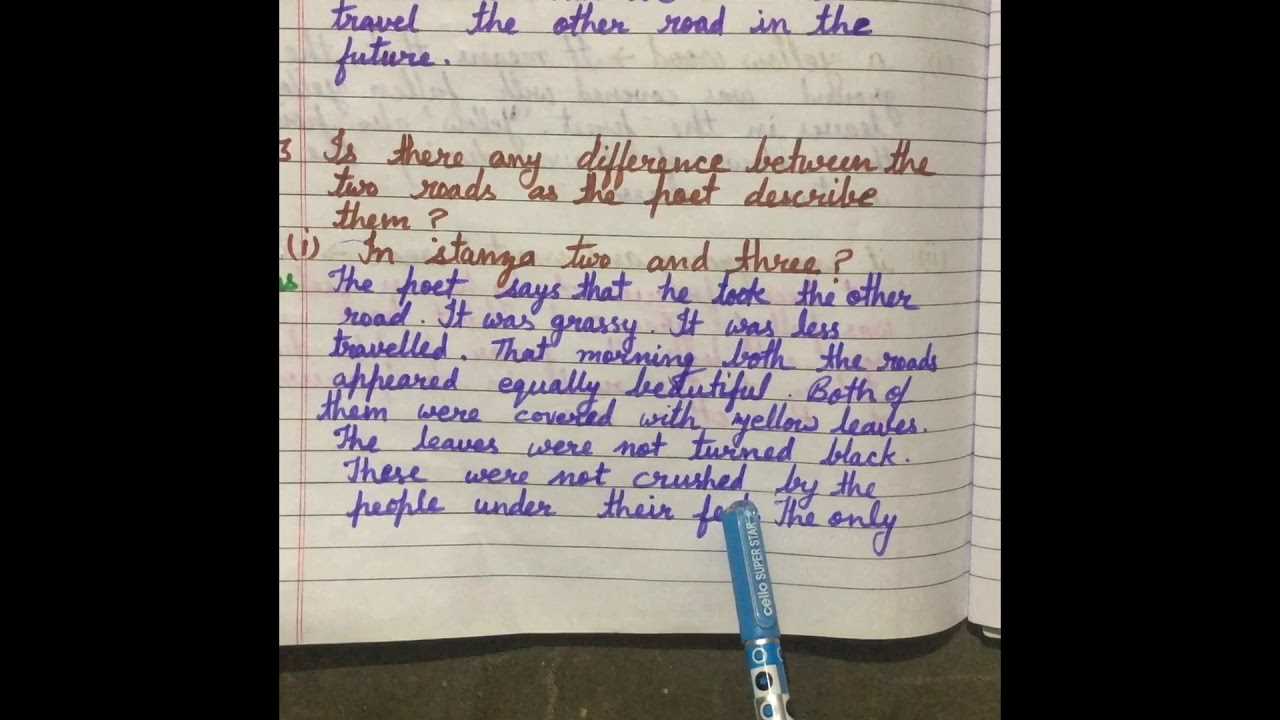
In this poem, fate plays a subtle yet significant role in shaping the speaker’s experience. While the individual is presented with choices, there is an underlying sense of inevitability, as if the outcome is somehow guided by forces beyond control. The speaker’s reflections suggest that no matter how much one tries to make a deliberate decision, the unfolding of events often feels predetermined. This tension between free will and fate raises important questions about how much influence we truly have over our own lives.
Throughout the poem, the speaker wrestles with the impact of their choice. Though they believe their decision is a meaningful one, the eventual realization that it may not have been as significant as once thought highlights the complexity of fate’s role. It implies that no matter which path is chosen, life will follow its own course, influenced by factors beyond mere human control. This uncertainty underscores the idea that individuals may perceive themselves as masters of their fate, but in reality, external forces often shape their journey.
The way in which fate weaves into the speaker’s narrative encourages readers to reflect on their own experiences. Life’s decisions may seem monumental in the moment, but time often reveals how little control one truly has over the bigger picture. This interplay between choice and destiny is central to understanding the emotional depth of the poem, offering a nuanced perspective on the human condition.
Interpreting the Poem’s Ambiguity
One of the most compelling aspects of this poem is its deliberate ambiguity, which leaves much open to interpretation. The speaker’s reflections on their choice are marked by uncertainty, and the meaning of their decision is shrouded in doubt. This ambiguity invites readers to explore different layers of understanding, prompting them to consider not just the speaker’s experience but also their own relationship with life’s choices. By presenting an indecisive and open-ended narrative, the poem mirrors the complexities of human existence, where answers are rarely clear-cut.
Uncertainty in Decision Making
The poem’s lack of definitive outcomes reflects the inherent uncertainty of making significant choices. The speaker doesn’t claim to have made the right decision or even to fully understand the implications of their choice. This openness suggests that in life, it’s impossible to foresee the impact of decisions with complete clarity. Every choice is fraught with ambiguity, where the future remains uncertain no matter how confident one may feel in the moment.
Multiple Interpretations
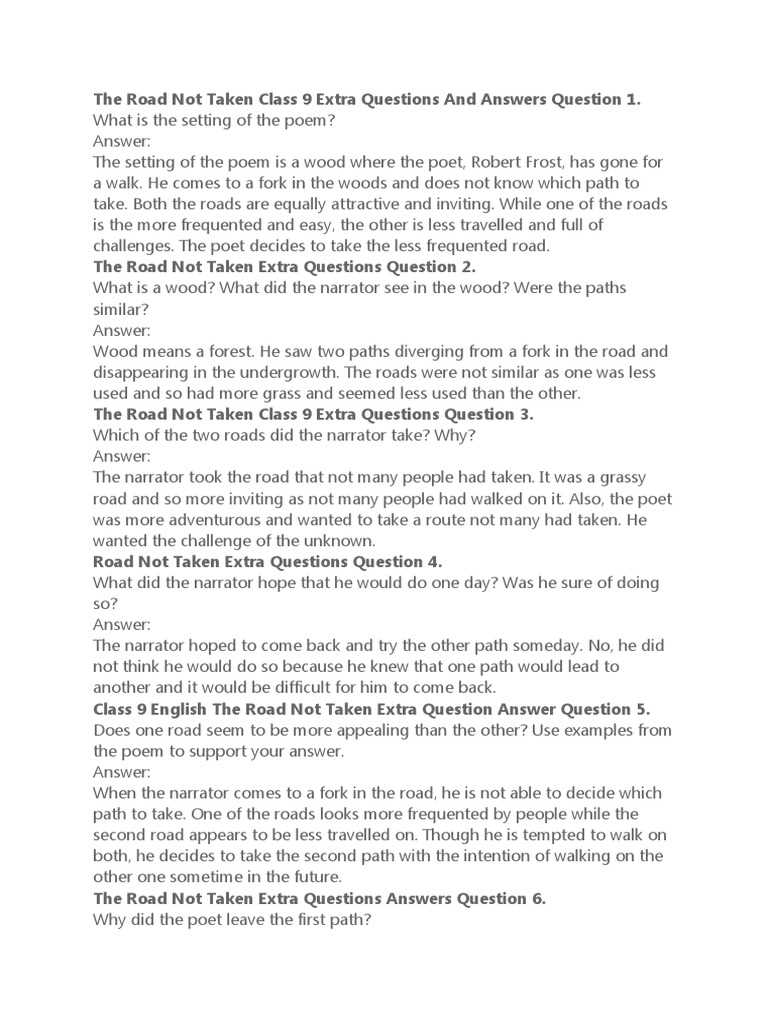
- Personal Growth: Some readers might view the ambiguity as a representation of the ongoing process of self-discovery. Each choice, whether it leads to success or failure, contributes to personal development.
- Regret or Satisfaction: Others might see the uncertainty as reflecting the emotional complexity of life, where every decision can lead to a mixture of satisfaction and regret, depending on how it is remembered.
- Reflection on Time: The ambiguity also prompts a consideration of how time distorts the clarity of past choices, making them seem more significant in retrospect than they may have appeared at the time of making them.
Ultimately, the poem’s ambiguity challenges readers to engage with their own experiences of decision-making. By leaving the outcome unclear, it encourages introspection and emphasizes the complexity of human choices, suggesting that no matter how we look at them, they are always subject to change, reinterpretation, and the passage of time.
The Role of Free Will in Decisions
At the core of this poem lies a significant philosophical concept: the role of personal choice in shaping one’s path. The speaker reflects on the decision-making process, where each option appears equally valid, yet only one can be chosen. This tension raises the question of whether our choices are truly the result of free will or if external forces influence our decisions. By examining this internal struggle, the poem highlights the complexities of exercising autonomy and the uncertainty that often accompanies such decisions.
Exercising Personal Agency
The speaker’s contemplation of two equally viable paths suggests an underlying belief in free will. Despite the many external factors that may impact decision-making, the act of choosing is presented as an exercise of personal agency. The speaker does not attribute their decision to fate or destiny, but instead to their own desires and reflections. This emphasizes the importance of conscious decision-making, where each choice is a reflection of individual will.
Limitations of Free Will
- External Influences: While free will is highlighted, it is also clear that external factors–such as societal norms, personal experiences, or even chance–can subtly shape one’s options.
- Uncertainty of Consequences: The speaker acknowledges that no matter how freely a choice is made, its outcomes remain unknown, reinforcing the idea that even in exercising free will, one cannot predict the results with certainty.
- Regret and Reflection: In retrospect, the speaker wonders if the choice made was the right one, illustrating the complexity of free will in the face of irreversible decisions.
Through this reflection, the poem invites readers to consider their own experiences of choice, autonomy, and regret. It suggests that while free will plays a critical role in decision-making, the consequences of those choices often transcend one’s ability to control them entirely.
Frost’s Legacy in Modern Literature
Robert Frost’s influence on contemporary writing is profound, with his distinctive voice and themes continuing to resonate through modern works. His exploration of nature, human experience, and internal conflict has shaped how many authors approach similar subjects in today’s literary world. By blending accessible language with deeper philosophical themes, Frost left an enduring imprint that still informs poets, novelists, and lyricists alike.
Frost’s ability to make ordinary experiences seem extraordinary has made him a touchstone for modern authors who seek to evoke both simplicity and complexity in their writing. His subtle use of metaphor, coupled with a keen understanding of the human condition, enables his works to be timeless. This ability to provoke deep reflection through seemingly straightforward language is one of the key reasons his influence persists.
Influence on Contemporary Poets
Modern poets often look to Frost’s work as a model for combining narrative with poetry. His style, which seamlessly blends narrative storytelling with verse, continues to inspire poets striving to tell complex stories in simple, accessible language. Many contemporary poets have adopted similar themes, exploring the tension between individual choice and larger existential questions, much as Frost did throughout his career.
Impact on Modern Fiction
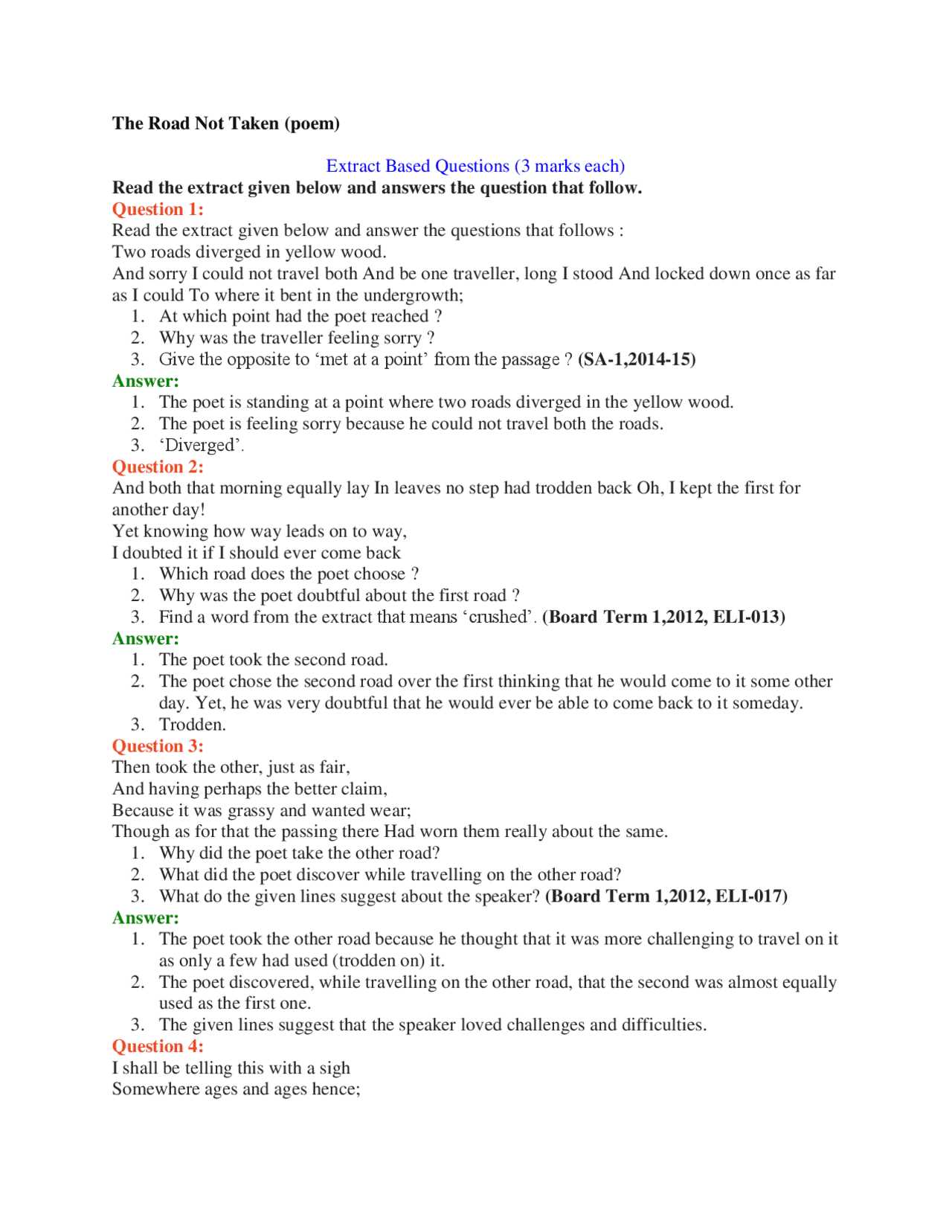
- Character Complexity: Frost’s characters often grapple with difficult choices, self-doubt, and reflection, themes that are echoed in many contemporary novels and short stories.
- Setting as Reflection of Emotion: The natural landscapes in Frost’s work often serve as more than mere backdrops, acting as metaphors for internal emotional states–a technique that has been widely adopted in modern fiction.
- Philosophical Exploration: Frost’s poems raise profound questions about life, choice, fate, and regret, which continue to influence modern writers exploring existential themes.
Ultimately, Robert Frost’s legacy in modern literature is marked by his ability to blend the simplicity of rural life with complex emotional and philosophical depth. His work remains a benchmark for literary excellence and continues to inspire writers who seek to connect the personal with the universal.